|
|
|
 |
Bhoot
|
 |
| |
Producer: Nitin Manmohan
Director: Ram Gopal Verma
Starring: Urmila Matondkar, Ajay Devgan, Seema Biswas, Nana Patekar, Rekha, Fardeen Khan, Victor Bannerjee
Music: Salim-Sulemain, Anand Raj Anand, Amar Mohile, Bapi
Lyrics: Lalit Marathe, Praveen Bhardwaj, Jaideep Sanhi, Sa
Genre: Horror
Recommended Audience: Parental Guidance
Film Released on: 30 May 2003
|
Reviewed by: Suraj Das - Rating: 8.0 / 10
 |
|
|
 |
 |
 |
 Let us know what you think about this review Let us know what you think about this review
|
| Public Rating Average: 5.11 / 10 (rated by 412 viewers) |
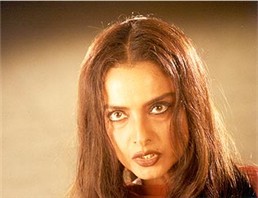 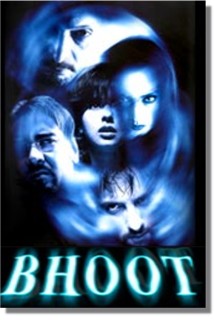 Ram Gopal Verma is one auteur whose name is synonymous with innovation; he is the rare mainstream Hindi director who always pushes the envelope and breaks the mould to realize his unique visions and make inspired films. Inspiration, however, does not always guarantee high quality. Verma’s latest film, Bhoot, sees the director at his most experimental, but all of his creativity and charge is short-changed by the slowness and monotony of the screenplay. Ram Gopal Verma is one auteur whose name is synonymous with innovation; he is the rare mainstream Hindi director who always pushes the envelope and breaks the mould to realize his unique visions and make inspired films. Inspiration, however, does not always guarantee high quality. Verma’s latest film, Bhoot, sees the director at his most experimental, but all of his creativity and charge is short-changed by the slowness and monotony of the screenplay.
The film centers on the story of a young couple. Vishal (Ajay Devgan) and Swati (Urmila Matondkar) are new residents in a high-rise located in the heart of Mumbai. The prior resident of the couple’s apartment had committed suicide by leaping from the balcony of their suite. Swati learns about this incident shortly after moving in and becomes oddly fixated with the story. Then, a series of inexplicable experiences drive Swati to near madness.
Vishal becomes helpless and convinced his wife has developed some sort of psychological disorder. He consults a psychiatrist, Dr. Rajan (Victor Banerjee). The couple’s maid (Seema Biswas) believes Swati to be possessed, and calls in an exorcist (Rekha).
Meanwhile, other seemingly unrelated events take place around the building. The watchman (Sabeer Masani) is being terrorized, one of the residents (Fardeen Khan) is behaving erratically, and a murder occurs. Inspector Liaqat Quereshi (Nana Patekar) is sent to investigate the murder at the building. All the while, neither the psychiatrist nor the exorcist makes much progress with Swati.
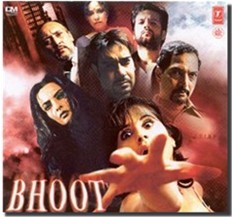 The greatest detractor in this enterprise is the screenplay. The script begins on a fairly conventional and clichéd note as far as horror films are concerned, but manages to incorporate some novel twists and genuinely frightening sequences leading up to Swati’s becoming possessed. The greatest detractor in this enterprise is the screenplay. The script begins on a fairly conventional and clichéd note as far as horror films are concerned, but manages to incorporate some novel twists and genuinely frightening sequences leading up to Swati’s becoming possessed.
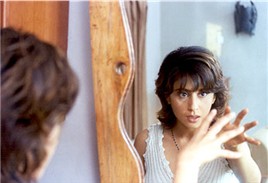 Once Urmila’s character takes the plunge into madness, however, the script takes a dive as well. More and more of the duration time passes away and very few truly notable developments transpire. The writers seemed to have intentionally kept the first half slow in an attempt to build tension and atmosphere, but the repeated exposition quickly grows tiresome and the entire film begins to sink to rambling depths. Once Urmila’s character takes the plunge into madness, however, the script takes a dive as well. More and more of the duration time passes away and very few truly notable developments transpire. The writers seemed to have intentionally kept the first half slow in an attempt to build tension and atmosphere, but the repeated exposition quickly grows tiresome and the entire film begins to sink to rambling depths.
The second half avoids the inconsequential nature of the first, but leaves a lot to be desired nonetheless. Post-interval, the script goes into overdrive and new characters and storylines shoot forward every moment. Unfortunately, the new characters and plots lack development. As the film races towards its conclusion, there is too much going on screen, too fast, and much of the dramatic and frightening impact of the film is lost as a result.
The rather clichéd finale ties together all of the plotlines of the film, and explains once and for all the mystery and motive that drives the spirit of the apartment to haunt and manipulate the building’s residents.
 Despite the awkward pacing and somewhat disappointing climax, Ram Gopal Verma’s extraordinary storytelling abilities do manage to uplift the film to some extent. Verma’s ability to establish mood is exemplary. It becomes very clear early on in the film that Verma has meticulously calculated everything from the composition of each shot to the expression on each actor’s face to maximize the effect of each sequence on the viewer. And early on in the film, the results are nothing short of terrifying. It was a tragic miscalculation on the screenwriters’ part to assume that more and more time needed to be spent creating atmosphere; Verma’s direction establishes dark and frightening undertones from the very beginning. It’s the constant repetition in the first half that serves to diminish the frightening impact of the film. Despite the awkward pacing and somewhat disappointing climax, Ram Gopal Verma’s extraordinary storytelling abilities do manage to uplift the film to some extent. Verma’s ability to establish mood is exemplary. It becomes very clear early on in the film that Verma has meticulously calculated everything from the composition of each shot to the expression on each actor’s face to maximize the effect of each sequence on the viewer. And early on in the film, the results are nothing short of terrifying. It was a tragic miscalculation on the screenwriters’ part to assume that more and more time needed to be spent creating atmosphere; Verma’s direction establishes dark and frightening undertones from the very beginning. It’s the constant repetition in the first half that serves to diminish the frightening impact of the film.
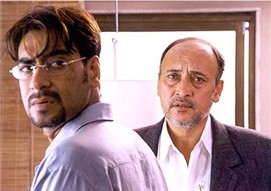 Verma’s truly bold choice to defy a number of Bollywood conventions merits admiration. It’s refreshing to find a big-budget Hindi film without unneeded song and dance sequences and comic relief tacked on to it. The film stays entirely on track throughout its duration, and is all the more effective as a thriller because of it. Hopefully other directors in India will realize that not all films have to be musicals, and follow Verma’s lead towards better, more effective filmmaking. Verma’s truly bold choice to defy a number of Bollywood conventions merits admiration. It’s refreshing to find a big-budget Hindi film without unneeded song and dance sequences and comic relief tacked on to it. The film stays entirely on track throughout its duration, and is all the more effective as a thriller because of it. Hopefully other directors in India will realize that not all films have to be musicals, and follow Verma’s lead towards better, more effective filmmaking.
Cinematography by Vishal Sinha is outstanding; his claustrophobia-inducing camera angles, spooky exteriors, and calculated close-ups keep the tension jacked up throughout the film. The score by Salim-Suleiman never lets up its shrill, frightening pitch and lingers in your mind far longer than any other score in recent memory. The visual effects are noteworthy and never once look synthetic. These production values combine to make Bhoot one of the finest films produced in India in quite some time, from a purely technical standpoint.
The strongest suit of the film, however, is easily Urmila’s breathtaking, career-best performance. Hands down the finest work by any performer all year, the quality of Urmila’s work soars far beyond all expectations. The way she seamlessly melts her characters different moods, fits, and actions is a sight that must be beheld to be believed. Every single one of her expressions, dialogs, and screams are delivered with an inimitable flair and elegance that defies categorization. Her chilling portrayal is more than reason enough to watch the film several times through. It is hard to imagine any of Urmila’s contemporaries can manage a performance more deserving of awards in the coming year.
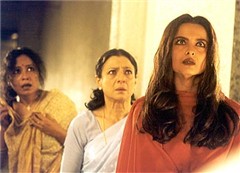 The rest of the talented ensemble performs admirably as well. Ajay Devgan, an incredible actor in his own right, does full justice to the frustration and agony experienced by his character. This is a solid performance from Devgan, but his character wasn’t written with enough nuances to make his work here stand-out as some of his best. Victor Banerjee and Seema Biswas strike all the right notes, despite the short length of their roles. Rekha is at her eccentric best, conjuring up an intense, disturbing fear each time she walks on screen. Nana Patekar’s character is one-dimensional but well enacted, and even Fardeen Khan manages to leave an impression. Clearly, Ram Gopal Verma was in full-form directorially while shooting this film. The rest of the talented ensemble performs admirably as well. Ajay Devgan, an incredible actor in his own right, does full justice to the frustration and agony experienced by his character. This is a solid performance from Devgan, but his character wasn’t written with enough nuances to make his work here stand-out as some of his best. Victor Banerjee and Seema Biswas strike all the right notes, despite the short length of their roles. Rekha is at her eccentric best, conjuring up an intense, disturbing fear each time she walks on screen. Nana Patekar’s character is one-dimensional but well enacted, and even Fardeen Khan manages to leave an impression. Clearly, Ram Gopal Verma was in full-form directorially while shooting this film.
Bhoot is a well-directed, well-made, and well-acted film with a lackluster script. It’s slightly above average work from Ram Gopal Verma, which is disappointing coming from the great director, but is still far superior to the average Hindi fare coming out each week. Flawed but entertaining, the thriller definitely is enjoyable enough to warrant at least one viewing. Watch it; if not for Verma’s direction, then for the fact that words aren’t enough to describe how compelling, convincing, and utterly terrifying Ms. Matondkar’s performance is in this film.
|
|
|


